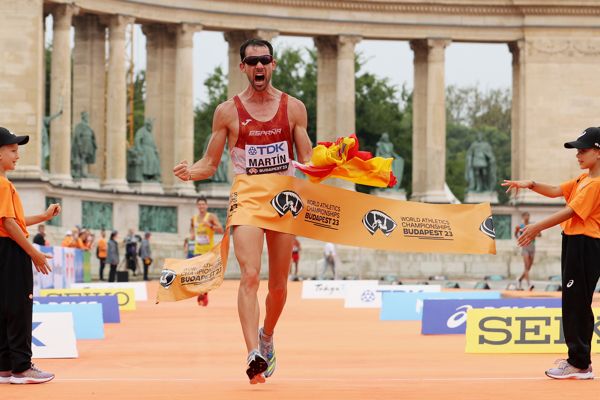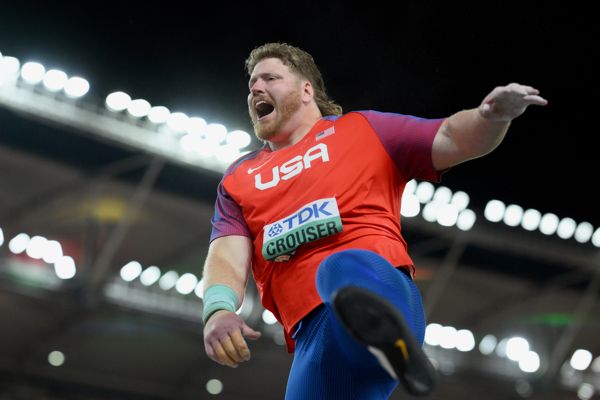Alvaro Martin became the first gold medallist at the World Athletics Championships Budapest 23 as he won a storm-delayed men’s 20km race walk.
The Spaniard took over from long-time leader Koki Ikeda with five kilometres remaining to become the first of this event’s Superheroes in Heroes Square.
The 29-year-old from Llerena, who missed an Olympic medal in this event by one place at the Tokyo Games, claimed his first global title in rain-swept conditions with a perfectly judged race that saw him come home in a world-leading 1:17:32.
Also judging his race superbly was Perseus Karlstrom, who won world bronze at 20km and 35km in Oregon last year and who earned a place one step higher on the podium with a Swedish record of 1:17:39, with bronze going to Brazil’s Caio Bonfim, who also set a national record of 1:17:47.
Canada’s Evan Dunfee, who earned bronze at the last men’s 50km race walk events to be held at the Olympics and World Championships, demonstrated how effectively he has switched his racing focus by finishing with the strength you might have expected to finish fourth in a national record of 1:18:03.
Martin, who won the 2018 European title and finished seventh in this event at last year’s World Championships, recalled his Olympic frustration in his moment of victory.
“I was fourth at the last Olympics Games, I missed the bronze which motivated me to work hard,” he said.
“In Tokyo, I felt when I was in the fourth position that I could win a medal. Unfortunately, it did not happen and that is why this gold medal is next step towards the next Olympic Games.
“I had an amazing race today, I did not expect to finish this fast, it is amazing. I cannot express all my feelings right now, it feels like a dream.
“I have one of the best coaches in the world, Jose Antonio Carillo, who is one of the best race walkers in history.
“I watched previous championships where Miguel Angel Lopez won and I cried a lot, I was really happy for him. I did the same now. I am really happy and I do not have words to express it.
“Huge thanks goes to my coach and my girlfriend, this is a medal for the team. Actually, my whole family came to support me. The next goal is the gold at the Olympic Games but the only thing I want to do now is to cry out of happiness. I am going to enjoy this moment.”
 Men’s 20km race walk medallists at the World Athletics Championships Budapest 23 (© Getty Images)
Men’s 20km race walk medallists at the World Athletics Championships Budapest 23 (© Getty Images)
Toshikazu Yamanishi, seeking a third consecutive title having beaten Ikeda to gold in Oregon last year, had no success today as he dropped out of contention before the halfway point and finished 24th in 1:21:39.
There was disappointment too for Italy’s Olympic champion Massimo Stano, who never figured in the leading contenders and failed to finish the race, as did Ireland’s David Kenny, with Lithuania’s Marius Ziukas being the sole athlete disqualified.
National records were also set by the fifth and sixth-place finishers Christopher Linke of Germany, who clocked 1:18:12, and Veli-Matti Partanan of Finland, who recorded 1:18:22.
The next two finishers – Brian Pintado of Ecuador and Australia’s Declan Tingay – set personal bests of 1:18:26 and 1:18:30 respectively.
It was one of the deepest races in history – and the best ever at a major championships – as a record 18 men finished inside 1:20. For the first time ever at a global championships, three men finished inside 1:18 and 10 men finished inside 1:19.
These results on the one-kilometre looped course along Andrassy Avenue in the city centre were all the more remarkable given the weather. While the ferocity of the initial storm which caused a two-hour delay to the event had abated, competitors still got underway in driving rain which had barely stopped before the event concluded.
Ikeda, Japan’s 25-year-old world and Olympic silver medallist, took off early on a lone quest that looked increasingly viable until he began to fade in the second half of the race.
 Koki Ikeda at the World Athletics Championships Budapest 23 (© Getty Images)
Koki Ikeda at the World Athletics Championships Budapest 23 (© Getty Images)
But after Turkey’s Salih Korkmaz had helped bridge the gap – before paying the price for his efforts – the brave contender dropped rapidly down to finish 15th in 1:19:44 – one place ahead of Korkmaz, who clocked 1:19:49.
Two hours after the race was originally due to have started the athletes set off in heavy rain and Brazil’s Caio Bonfim made the early pace before the red shirt of Ikeda made its way to the front as the field moved along the puddle-strewn, gleaming road surface.
Ikeda, with peaked cap pulled down over his brow, looked like a man on a mission as his efforts at the front began to string out the field. At the 4km mark he held a four-second lead over a main group in which his colleague Yamanishi was prominent.
By 5km that lead had increased to eight seconds as he passed in 19:18, with Yamanishi, Martin, Korkmaz and Pintado grouped behind him. At 6km Ikeda’s lead was 10 seconds.
The hatless Turkish athlete, hair plastered across his forehead, was making the most obvious efforts to bridge the gap, although just at his shoulder Yamanishi looked calm and collected, while Stano remained in the middle of the pack.
But still Ikeda pushed on as the rain reduced to a drizzle, extending his lead over the Turk to 16 seconds after 9km – the high point of his race.
As he approached the halfway point, Ikeda lapped his first athlete, moving past the labouring figure of Finland’s Jerry Jokinen, who briefly became a graphic counterpoint to the fine-tuned sharpness of the leader.
 The lead pack in the 20km race walk at the World Athletics Championships Budapest 23 (© Getty Images)
The lead pack in the 20km race walk at the World Athletics Championships Budapest 23 (© Getty Images)
Ikeda hit the 10km mark in 38:37, with Korkmaz and Bonfim passing the same point 15 seconds later. The main pursuing group of nine athletes was six seconds further back, led by Sweden’s hugely consistent Karlstrom, the world ranked No.1.
The chasing group contained the Chinese race walker who went into the race as the world leader, Zhang Jun, but he was dropping back. Yamanishi was also dropping back; at 11km he was almost a minute adrift of the man he beat to the world title last year.
Meanwhile, Dunfee was moving up and Korkmaz, now accompanied by Bonfim, was beginning to make some progress in his chasing quest, cutting the lead to 11 seconds by the 12km marker.
By the 14km point the lead was down to seven seconds as Bonfim began to bridge the gap in a serious way, with Korkmaz a couple of seconds adrift.
With five kilometres remaining, however, the shape of the race altered decisively as Martin surged forwards to take a marginal lead over the flagging Japanese racer, with Bonfim just three seconds behind.
Korkmaz, exhausted by his efforts, was dropping back fast in seventh place as Karlstrom and Dunfee – hardened racers both – moved past him into medal contention.
Also in the hunt was Kenya’s Samuel Gathimba, who finished fourth over 20km in Oregon last year, just missing the distinction of becoming Africa’s first race walking world medallist. Gathimba, however, eventually finished ninth here in 1:18:34.
By 17km Martin had forged an eight-second lead over Bonfim, while Karlstrom had moved through into a position to add another world bronze to his collection, just two seconds behind the Brazilian and nine seconds clear of Dunfee.
The effort was showing in Bonfim’s face as he strove to keep the Spaniard in range, but with two kilometres the powerful figure of Karlstrom was at his shoulder and past him.
There was a historic performance further down the field, as Portugal’s 47-year-old Joao Vieira, making his 13th World Athletics Championship appearance – equalling the record held by Spanish race walker Jesus Angel Garcia – finished an honourable 33rd of the 47 finishers in 1:23:37.
Mike Rowbottom for World Athletics
| MEN’S 20km RACE WALK MEDALLISTS | ||
| 🥇 | Alvaro Martin 🇪🇸 ESP | 1:17:32 WL, PB |
| 🥈 | Perseus Karlstrom 🇸🇪 SWE | 1:17:39 NR |
| 🥉 | Caio Bonfim 🇧🇷 BRA | 1:17:47 NR |
| Full results | ||
Credit: World Athletics



